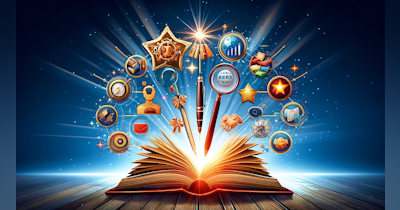I understand where you’re coming from. I’ve spent countless hours pouring my heart and soul into writing books I believed could make a difference in people’s lives. Books I knew were full of valuable wisdom and perspectives, ready to inspire and enlighten.
When I wrote my first book, I remember looking at my bookshelves and wondering why some books became bestsellers while others stayed hidden gems.
An excellent manuscript is one piece of the book marketing puzzle. Another critical piece is understanding the psychology of your potential readers and how to evoke the right emotions and actions to sell your book effectively.
After reading Dr. Robert Cialdini’s bestselling and enlightening book, “Influence: The Psychology of Persuasion,” I became fascinated by the world of psychological triggers and how they apply to marketing and selling a non-fiction book.
Let’s explore how you can use seven powerful strategies to take your book to new heights of success.
1. Create Irresistible Curiosity
Imagine two book descriptions. One says, “A book about time management techniques.” The other teases, “Unlock the secret to doubling your productivity with these 5 simple steps!” Which one captures your interest more? The second, right?
That’s the power of curiosity. People are naturally drawn to things that pique their interest. Craft a compelling, curiosity-arousing title and description to market your non-fiction book effectively. Make your potential readers wonder, “What’s inside that can benefit me?” A tantalizing glimpse will make them more likely to dive into your book.
Benefit: By generating curiosity, you increase the chances of potential readers picking up your book, ultimately leading to more sales.
Action: Craft a catchy, intriguing title and description for your non-fiction book that highlights the most enticing aspects of your content.
2. Leverage the Fear of Missing Out (FOMO)
Human psychology is riddled with the fear of missing out. When people see others benefiting from something, they want to be part of it, too. Contrast this with the feeling of being left behind.
Want to sell more books? Showcase the positive experiences and results your book has brought to readers. Share testimonials, reviews, and success stories from those who have benefited from your knowledge. When potential readers see others thriving with your book, they’ll be more inclined to join the success story.
Benefit: By tapping into FOMO, you build trust and encourage potential readers to take action and buy your book.
Action: Collect and display authentic testimonials and reviews on your book’s website, social media, and marketing materials.
3. Use the Power of Reciprocity
Do you know what happens when you give someone a thoughtful gift? They naturally feel the urge to reciprocate. This psychological trigger is a potent tool in book marketing. You can offer valuable content, such as a free downloadable chapter, a helpful resource, or a short video series related to your book. When you provide something of value, people tend to feel obligated to give back, often by purchasing your book.
Benefit: By offering something valuable upfront, you create goodwill and increase the likelihood of converting potential readers into buyers.
Action: Create free, high-quality resources or content related to your book and use them to attract and engage your target audience.
4. Appeal to Emotions, Not Just Logic
While facts and figures are crucial in non-fiction books, don’t forget the power of emotions. Readers often make decisions based on how a book makes them feel. Do your words inspire hope, empathy, or determination? Do they evoke nostalgia, passion, or excitement? Emotions create a connection that mere data can’t replicate.
Benefit: By including emotional appeal in your marketing materials, you can connect with potential readers and increase their likelihood of buying your book.
Action: Infuse your book marketing copy with emotional elements that resonate with your target audience’s feelings and aspirations.
5. Establish Authority and Trust
Readers are more likely to buy a non-fiction book from an author they perceive as an expert. It’s human nature to trust those who seem knowledgeable and credible. But how can you establish your authority?
Write articles or blog posts about your book’s topic, speak at relevant conferences, and participate in interviews or podcasts. Share your insights and expertise across various platforms. When potential readers see you as a trusted authority, they’ll be more inclined to buy your book.
Benefit: Building trust and authority increases your credibility and boosts your book’s sales potential.
Action: Consistently share your knowledge and insights through various channels and engage with your target audience meaningfully.
6. Offer Limited-Time Deals and Bonuses
Would you be more motivated to buy a book available at a regular price or one on sale for a limited time with added bonuses? The latter, right? Limited time offers create a sense of urgency and excitement. People don’t want to miss out on a good deal, and that’s where the power of scarcity comes into play.
Benefit: By offering exclusive deals and bonuses for a limited time, you can increase your book’s sales and motivate readers to buy.
Action: Promote special offers and time-limited bonuses to incentivize readers to purchase.
7. Engage Your Audience Actively
The final psychological trigger to keep in mind is engagement. Today’s readers want to feel like they’re part of something bigger. Build a community around your book, whether through a dedicated website, social media groups, or forums. Engage with your audience, ask for their input, and involve them in your book’s content discussions.
Benefit: By creating an active and engaged community, you increase the loyalty of your readers, fostering a sense of belonging and driving more sales.
Action: Start or join relevant online communities, encourage discussions, and actively respond to your readers’ questions and feedback.
The world of book marketing is a complex arena in which psychology plays a vital role. Leveraging psychological triggers is a powerful secret weapon for effectively marketing and selling your nonfiction book.
From curiosity and FOMO to reciprocity and emotional appeal, these strategies can turn potential readers into enthusiastic buyers. By following the practical action items I’ve shared, you can tap into psychology's power to boost your nonfiction book.
If you’re ready to take the plunge to unlock the full potential of your book’s marketing strategy, you’ll give your readers the chance to be swept away by your incredible work!
Want to tap into my 30+ years of book marketing expertise? Let’s brainstorm ways to sell your book in bulk. Sign up for a 20-minute complimentary session — BrainstormWithSusan.com











